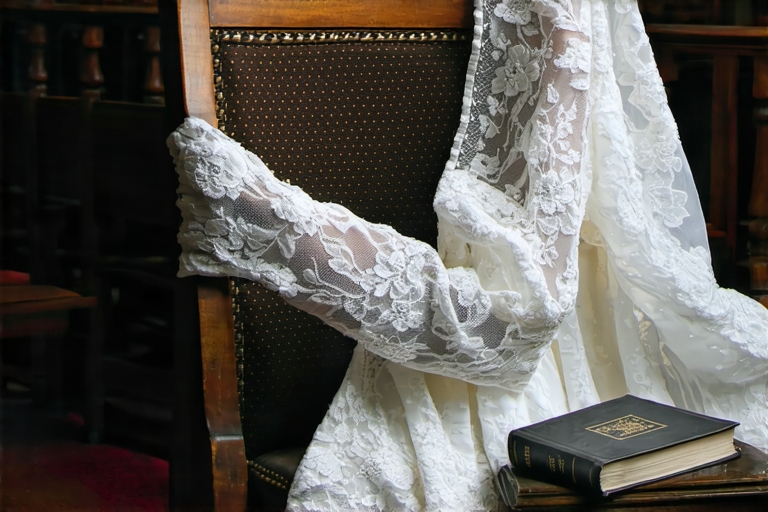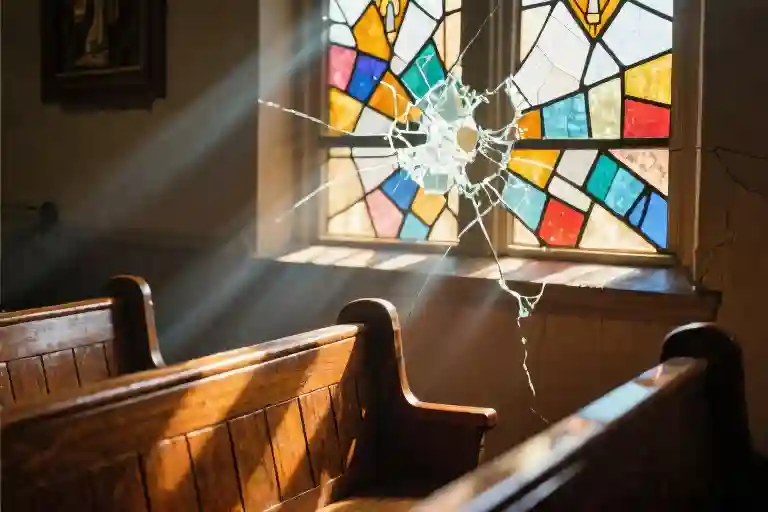At 24, I needed my father’s signature to open a bank account, but no one questioned when I vowed before God to love and obey a man for eternity. The irony wasn’t lost on me even then – in the eyes of our fundamentalist Baptist community, I was simultaneously too naive to manage a checking account yet sufficiently mature to become someone’s wife.
The contradictions ran deeper than banking paperwork. My white lace dress covered knees that had never been touched by a man – not even accidentally – while my bridal shower gifts included marital advice books detailing wifely duties. We spent months preparing for the wedding ceremony but received exactly zero conversations about what marriage actually demanded. The unspoken message was clear: technical virginity mattered more than emotional readiness, and compliance trumped comprehension.
This paradox defines conservative religious womanhood – you’re treated as a perpetual child in matters of autonomy but expected to perform as a grown woman when it serves traditional structures. They called it protection. It felt more like selective adulthood, granting just enough maturity to fulfill predetermined roles while withholding the tools to question them.
What unsettles me now isn’t just my own story, but recognizing how these frameworks operate beyond church walls. When state legislators debate whether teenagers need parental consent for birth control but not marriage licenses, I hear echoes of that same twisted logic. The vocabulary shifts from ‘biblical womanhood’ to ‘family values,’ yet the mechanism remains: control disguised as care, restriction framed as safeguarding.
Perhaps the most insidious part is how we internalize these contradictions. I genuinely believed choosing marriage proved my spiritual maturity, never noticing how the system engineered that very thought. Real protection would have meant teaching me to distinguish between rebellion and authentic choice, between escaping my father’s house and truly leaving it.
Sacred Handcuffs: My Fundamentalist Wedding
The sanctuary smelled like lilies and mildew, a scent I’d later recognize as the olfactory signature of every Baptist church basement. At 24, I stood at the altar in a dress with sleeves that scratched my elbows—modesty measured in fabric thickness. My father’s grip on my arm left temporary indentations as he performed the ritual transfer, passing me like a baton in some sacred relay race where the finish line was lifelong submission.
Speaking in tongues erupted from the third pew, glossolalia dripping over the organ music. Pastor Michaels’ two-hour sermon included seven references to wifely obedience and exactly zero about mutual respect. The congregation nodded along to verses about women being ‘the weaker vessel,’ their amens rising like steam from a pressure cooker.
What fascinates me now isn’t the ceremony itself, but the cognitive dissonance baked into its symbolism. That morning, I’d needed my father’s co-signature to refinance my student loans—apparently I lacked the maturity to handle debt—yet here I was, deemed fully qualified to legally bind myself to a man forever. The church’s version of adulthood came with bizarre prerequisites: capable of raising children, incapable of choosing my own healthcare.
The ‘giving away’ ritual took on grotesque clarity when viewed through this lens. My father’s trembling voice as he promised I’d been ‘kept pure’ revealed the transaction’s true nature: not a celebration, but a quality assurance certification. They’d preserved me like fruit in jam jars, only to crack the seal at this precise moment.
Three things still haunt me about that day:
- How the wedding cake’s fondant roses matched the upholstery of the ‘crying room’ where mothers took bawling infants—a space I’d occupy within eleven months
- The way older women whispered ‘you’ll learn’ when I hesitated during the obedience vow
- The missing item on what should have been my adulting checklist: Develop independent decision-making skills
This is how fundamentalism grooms women: we’re handed adult responsibilities while being systematically denied adult autonomy. The ceremony wasn’t just a wedding—it was a graduation where they handed me a diploma in compliance and burned the curriculum for critical thinking.
The Approved Checklist of Adulthood
In my church, becoming an adult as a woman came with a peculiar set of permissions and prohibitions that would baffle most modern psychologists. The rules weren’t written down anywhere, yet every girl understood them by puberty – an unspoken curriculum for womanhood approved by our fundamentalist community.
What We Were Allowed:
- To marry straight out of Bible college (or even high school with parental consent)
- To bear children before our bodies finished developing
- To lead Sunday school classes for toddlers
- To bake casseroles for church potlucks that could feed thirty families
What Remained Forbidden:
- Traveling alone without male supervision until age 30
- Questioning the pastor’s interpretation of Scripture
- Wearing jeans to Wednesday night service
- Opening a bank account without husband/father cosignature until marriage
Dr. Eleanor Reinhart, a psychologist specializing in religious trauma, calls this phenomenon “selective maturation.” “These communities accelerate developmental milestones related to marriage and childbearing while deliberately stunting growth in financial literacy, independent decision-making, and sexual agency,” she explains. “It creates women who can birth babies but can’t balance checkbooks, who can recite Scripture but can’t negotiate salaries.”
The cognitive dissonance was most apparent when my youth group celebrated my wedding shower the same month my college roommate (from a secular family) got accepted to medical school. While her family toasted to her academic achievement, mine presented me with embroidered dish towels and whispered advice about keeping my husband satisfied. Both were rites of passage – only mine came with an expiration date on personal ambition.
This curated adulthood extended into every decision. I could choose between vanilla or chocolate cake for my reception, but not whether to have a reception at all. I could debate the merits of homeschooling versus Christian school for future children, but not whether to have children. The illusion of choice masked the rigid boundaries – like being allowed to rearrange furniture in a locked room.
What unsettles me now isn’t just the restrictions themselves, but how seamlessly we internalized them. The rules didn’t feel oppressive because we’d never known alternatives. When my cousin announced her engagement at nineteen, we praised her maturity. When another girl deferred marriage to finish college, we secretly questioned her spiritual priorities. Our metric for adulthood had nothing to do with psychological readiness and everything to do with compliance to gendered expectations.
Years later, I’d discover most developmental psychologists define adulthood through markers like emotional regulation, financial independence, and identity formation – none of which required a wedding ring. But in our world, the white dress wasn’t just fabric; it was a graduation gown from personhood into propriety.
Holy Water in the Secular World: When Ideology Drips Into Policy
The same hands that passed me a purity ring at sixteen now draft legislation about my uterus. I wish this were hyperbole, but the voting records don’t lie – 83% of state representatives who sponsored recent abortion bans in Texas regularly appear at the same evangelical conferences where I once sang worship songs. The stained glass ceiling isn’t just metaphor; it’s become legislative reality.
What shocked me most after leaving wasn’t how extreme my childhood church was, but how ordinary its ideas had become in courtrooms and classrooms. The TradWife influencers flooding my algorithm with homesteading reels and submission sermons aren’t fringe figures – they’re the polished public face of the same ideology that required my wedding dress to have sleeves. Only now it’s repackaged as ‘wellness’ and ‘traditional values.’
Consider the data points:
- Counties with evangelical megachurches show 22% higher teen marriage rates than national averages (Pew Research 2022)
- States passing ‘parental rights’ education laws overlap significantly with areas where homeschooling for religious reasons tripled since 2019 (CDC/NHERI)
- The same biblical arguments I heard against women preaching now surface verbatim in corporate diversity training lawsuits
The mechanism is deceptively simple: first make alternative choices unimaginable, then make them illegal. I remember being fifteen and told college might ‘endanger my faith.’ Now I watch as state universities eliminate gender studies programs citing ‘moral concerns.’ The playbook hasn’t changed – just the playing field.
Perhaps most insidious is the aesthetic rebranding. The bonnets and homesteading of TradWife TikTok make patriarchal control look like a lifestyle choice. Comments gush over their ‘peaceful’ lives – never mentioning these creators’ ties to organizations fighting against no-fault divorce laws. It’s fundamentalism in cottagecore drag.
I catch myself envying their certainty sometimes. Then I remember my own wedding video – how my smile didn’t reach my eyes when I promised to obey. Some freedoms can’t be filtered into something Instagrammable.
Rewriting My Catechism
The first time I ordered coffee without mentally calculating whether my husband would approve of the expense, it felt like stealing. That’s how deeply religious conditioning embeds itself – turning basic autonomy into something that feels illicit. This section isn’t about rejecting faith, but about untangling the difference between divine connection and human control.
Start with these questions (write your answers on actual paper – there’s power in seeing ink contradict old beliefs):
- When making decisions, whose voice do you hear most clearly: God’s, your pastor’s, or your own?
- List three personal boundaries you’ve violated to maintain ‘good Christian’ appearances
- What childhood dreams got buried under ‘godly woman’ expectations?
My own answers shocked me. The ‘God’s voice’ I’d been obeying turned out to be a patchwork of youth group lectures and my father’s frowns. That floral journal where I’d scribbled teenage dreams of backpacking through Spain? Replaced by a wedding planner before I turned 20.
Building new frameworks takes practice. Try these exercises over morning coffee (decaf if you’re still weaning off the rapture anxiety):
- The Permission Slip: Write yourself official-looking approval for things your religion forbade. Mine read: ‘This certifies that Sarah is allowed to: a) Enjoy sex b) Say no to potlucks c) Vote Democrat’
- Secular Hymns: Rewrite oppressive Bible verses as affirmations. ‘Wives submit to your husbands’ becomes ‘Partners respect each other’s autonomy’
- Guilt Triage: When shame surfaces, ask: ‘Is this harming anyone, or just violating someone’s control?’
- Sacred No’s: Practice refusing small requests to rebuild boundary muscles. Start with telemarketers before tackling family.
- Heretical Self-Portrait: Draw/write your identity without religious labels. Notice what remains when ‘godly woman’ is erased.
The tremors will come. I nearly vomited the first time I checked out The God Delusion from the library. But with each exercised ‘no’, the trembling lessens. You’re not destroying your faith – you’re sifting gold from the mud of man-made doctrine.
What surprised me most wasn’t the anger that surfaced, but the grief. Grief for the girl who thought love required surrender, for the years spent monitoring skirt lengths instead of personal growth. Let it come. These tears water the soil where your authentic self finally grows.
The Water I Chose to Walk Through
There’s a moment in every fundamentalist baptism when the preacher’s hand presses down on your back – not enough to hurt, just enough to remind you who’s in control. For years, I thought that was what surrender felt like. My white dress baptism at 24, my vows whispered through trembling lips, the way I let my father place my hand in my husband’s like some sacred relay race. I mistook obedience for devotion, silence for wisdom.
Now I know real baptism isn’t something done to you. It’s the water you choose to walk through yourself, eyes wide open, lungs burning with the truth you’ve decided to swallow. Mine came in fragments: the first time I said ‘no’ without apologizing to heaven, the afternoon I bought birth control without consulting my pastor, the dizzying freedom of realizing my body had always been mine.
They never tell you how loud unlearning sounds. The creak of a church pew you leave for the last time carries more finality than any wedding vow. The pages of your old Bible rustle differently when you read them as literature rather than law. Even now, sometimes I catch myself reaching for phantom rules – wondering if my thoughts are pious enough, if my choices would pass some celestial inspection.
What surprises me most isn’t how long it took to leave, but how thoroughly that world still lives in my muscles. The way my shoulders still tense when a man raises his voice, how my first instinct at any achievement is to deflect praise rather than claim it. Religious trauma isn’t just shattered beliefs – it’s the body remembering what the mind has tried to forget.
But here’s what they can’t take: the quiet rebellion of making coffee slowly on Sunday mornings, the sacrilegious joy of sleeping in instead of confessing. There’s holiness in learning to hold your own hand when no one’s watching to grade your devotion. My healing hasn’t been a dramatic altar call – just daily decisions to trust myself more than I fear some distant judgment.
Perhaps this is the real meaning of being born again – not some theatrical dunking, but the million small resurrections it takes to become someone who can say, without hedging or shame: This is my life. These are my choices. The water was cold but I walked through anyway.
For those navigating similar journeys: Our [Religious Trauma Recovery Workshop] begins next month – a space to unpack, question and rebuild without dogma.





